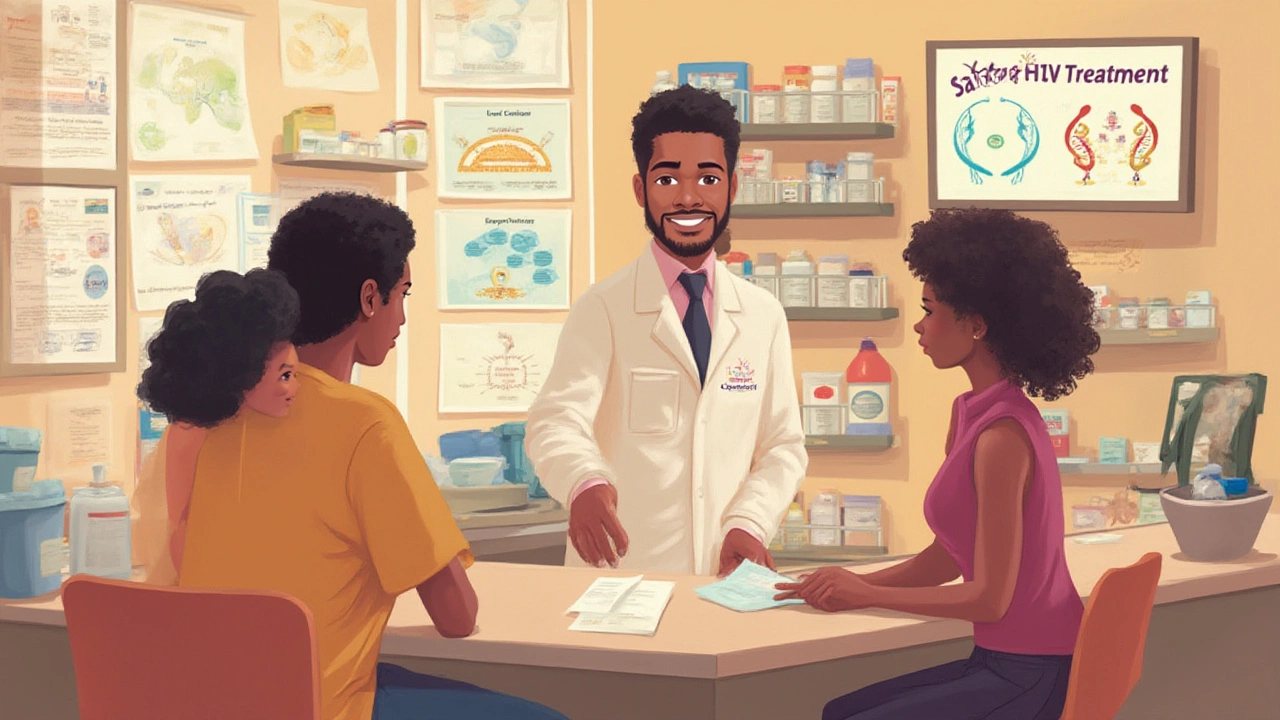Imagine you’ve just started taking a medication for HIV, expecting it to help. Instead, your body launches an all-out protest—you feel achy, feverish, your skin breaks out, and suddenly, you’re rushed to the ER. For people with HIV, this nightmare used to be a real risk with abacavir, a common antiretroviral drug. But now, with a genetic test, that drama is mostly avoidable. The world of HIV care got turned upside down (in a good way!) by a tiny stretch of DNA—a genetic marker called HLA-B*57:01—and the science of pharmacogenetics that spots it. Think of it as carrying a V.I.P. pass to safer, smarter medicine.
What is Pharmacogenetics—and Why Does It Matter in Abacavir Therapy?
Pharmacogenetics is basically the study of how your genes affect your reaction to drugs. Some people breeze through treatment, while others land themselves in hot water with side effects or allergic reactions, all because of their genetic blueprint. It’s a bit like how one person can down a bottle of hot sauce with zero complaints, and the next person breaks out in hives—only with much higher stakes. Nowhere is this more real than with abacavir, used in many HIV regimens since the late 1990s.
Before pharmacogenetics entered the scene, 5–8% of patients taking abacavir developed a scary hypersensitivity reaction, which can get so bad it’s life-threatening. In 2002, researchers finally cracked the code: people carrying a certain genetic marker—called HLA-B*57:01—were dramatically more likely to get this reaction. Suddenly, the field had a way to test for risk before someone even swallowed their first pill.
Here’s where it gets fascinating. Humans have countless genetic differences, but the HLA-B gene region is especially variable. This area helps your immune system tell friend from foe. When people with HLA-B*57:01 take abacavir, their immune cells get the wrong message—the drug binds to their HLA proteins, and the body thinks it’s under attack, sparking a dangerous allergic response.
Scientists put this to the ultimate test in a landmark clinical trial called PREDICT-1. Over 1,900 patients joined from Europe, Australia, and North America, and the results were crystal clear: not a single patient who screened negative for HLA-B*57:01 developed abacavir hypersensitivity. Meanwhile, rates of hypersensitivity plummeted overall. This trial didn’t just prove the genetic test worked—it also set the standard for how genetic screening gets woven into real-world medicine.
| Year | Event | Impact |
|---|---|---|
| 1998 | Abacavir approved for HIV | Offered a new treatment option |
| 2002 | Discovery of HLA-B*57:01 link | Explained dangerous reactions |
| 2008 | PREDICT-1 Trial published | Proved genetic screening saves lives |
So, what really happens today? Most clinics in North America, Europe, and Australia won’t even prescribe abacavir without first checking for HLA-B*57:01. Skip the test, and you run a known risk. Take the test, and abacavir becomes one of the safest options out there—no drama, no ambulance rides, just effective HIV control.
What’s wild is how quickly this guideline spread. The U.S. FDA updated abacavir’s labeling to require the genetic test, and a ton of treatment guidelines worldwide followed their lead. Now nurses, doctors, and even pharmacists all ask patients about their genetic results before giving out abacavir prescriptions. Suddenly, something simple—a single DNA test—became the key to avoiding one of the nastiest pitfalls in HIV care.
Is pharmacogenetics just about abacavir? Hardly—it’s the tip of the iceberg. But abacavir taught us how crucial it is to pair medicine with genetics for safer, more personal treatment plans.

Breaking Down the HLA-B*57:01 Test: How It Works and Who Should Get It
This isn’t like sending off your hair to a sketchy ancestry website. The HLA-B*57:01 test is quick, reliable, and specific—it’s usually done on a blood sample, sometimes even a cheek swab, with results in just a few days. In fact, it’s gotten so common, some HIV clinics automatically test new patients who might need abacavir.
But who actually needs the test? If you’ve never taken abacavir, you’ll get screened—simple as that. If you took abacavir years ago with no problems, odds are you’re fine, but if there’s any doubt, the test puts worries to rest. Genetic screening is a game-changer for people newly diagnosed with HIV and for those considering a switch in therapy. Pregnant women and kids get special attention too, since they often have fewer options for safe HIV drugs.
The big question always comes up: what does a positive test mean? If you test positive for HLA-B*57:01, abacavir just isn’t for you—that’s it. Your doctor will pick another medicine from the long list of HIV options. If you test negative, abacavir is considered safe. No middle ground, no guesswork. This black-and-white clarity is what makes the test such a powerhouse in everyday care.
To put a human face on it, think of this: researchers estimate that about 5–8% of people in European ancestry groups carry HLA-B*57:01. The numbers drop in African, Asian, and Hispanic populations—less than 2%—but testing is still standard practice worldwide. Skipping the test, even if the chance of a reaction is low, isn’t worth the gamble because the consequences can be so severe.
A lot of people guess that if a drug causes allergy in one person, it must be less safe for everyone—but with abacavir, it’s this one genetic switch. Remove the risk, and what’s left is a potent, well-tolerated HIV treatment.
The technical side isn’t as intimidating as it sounds. Labs use “PCR” (polymerase chain reaction) technology, which is just a sophisticated way to copy and look for the specific gene marker. It doesn’t reveal your whole DNA history—just answers one very focused question. Privacy protections apply, as with other medical tests, so patients can trust that their results won’t end up in the wrong hands.
There are even rapid versions of the test that can deliver answers within a day, perfect if someone needs to start treatment fast. Some hospitals keep rapid kits in stock, just in case. For patients scared off by words like 'genetic testing,' most clinics offer quick counseling to walk them through what the test is, how it helps, and what happens next.

Pharmacogenetics Beyond Abacavir: What’s Next for Personalized Medicine?
If one genetic test could make such a difference for abacavir, what about other drugs? You may be surprised: pharmacogenetics is creeping into all corners of medicine—from blood thinners like warfarin to antidepressants, and even some cancer treatments. But abacavir is often held up as the gold standard: a clear gene-drug link, a simple test, massive stakes, and game-changing results in the real world.
One interesting twist? Even as HIV treatments keep improving, abacavir remains a staple. It’s part of several powerful “fixed-dose combination” pills that make HIV therapy simpler—one pill a day, less hassle. For people who test negative for HLA-B*57:01, abacavir is as safe as other mainstay HIV drugs.
There’s big talk about making personalized medicine the future—where your genes guide every drug choice. But the story of abacavir is living proof it can work now, not just in science fiction. Some health systems are moving towards “pre-emptive” pharmacogenetic panels, where a single test at diagnosis can rule out dozens of dangerous reactions before they happen.
Treating HIV is already full of challenges—access, stigma, cost—but adding a simple genetic test solves one of them flat out. Insurance almost always covers the HLA-B*57:01 test, and public health programs in the US, UK, and Europe made it standard care years ago.
- Make sure your healthcare provider orders an HLA-B*57:01 test before starting abacavir—don’t settle for guesswork.
- If you’ve had abacavir before without problems, you probably aren’t at risk, but ask your doctor about testing if you’re unsure.
- Share your test result with every provider you see (including your pharmacist!).
- Don’t be afraid to ask questions—understanding your risks is part of good HIV care.
So the next time you hear about pharmacogenetics, remember this isn’t just about academic science. It’s about stopping life-threatening reactions before they ever happen—and making treatment smarter, safer, and more personal. Abacavir’s story shows how much power sits in a single genetic letter, and why it pays to know your own code. That genetic “V.I.P. pass” could be the difference between a life-changing medicine and a life-threatening emergency.


Comments (11)
Dilip Parmanand
July 10, 2025 AT 00:17This is a fascinating topic! Genetic testing before starting Abacavir therapy is indeed a smart move. It feels like a practical step to reduce risks and ensure patient safety.
Honestly, if we can take such a simple test to avoid potentially severe allergic reactions, why wouldn’t everyone do it? It’s a matter of common sense and preventive healthcare.
I hope this approach becomes widely adopted globally, especially in resource-limited settings where HIV treatment options and patient management are challenging. Education and awareness campaigns would be key in achieving this.
Sarah Seddon
July 10, 2025 AT 01:24Absolutely love how pharmacogenetics is revolutionizing HIV treatment! Knowing who is at risk for abacavir hypersensitivity through genetics feels like a superhero move in the medical world.
Imagine the relief and peace of mind for patients when they see that their therapy is tailored just for them. It transforms the whole experience, turning fear into hope.
It’s like medicine finally catching up to the uniqueness of each person’s biology. We’re really stepping into the future here, folks!
Calandra Harris
July 10, 2025 AT 02:31Honestly, this genetic testing is just common sense. It's infuriating how many people still ignore the obvious benefits of precision medicine. Those allergic reactions to Abacavir can be fatal yet ignored in some healthcare circles.
This is something every country with HIV programs ought to mandate right now. Anything less is a disgrace to medical ethics and progress.
Frankly, anyone opposing such life-saving measures is either uninformed or downright reckless.
Penny X
July 10, 2025 AT 03:37It is morally imperative that this genetic testing becomes standard practice globally. We must prioritize ethics in medicine and not treat patients as mere statistics.
Allowing people to suffer preventable adverse reactions, especially when a simple test exists, is unacceptable. This post highlights the critical need for a shift in how societies view healthcare responsibility.
We must advocate fiercely for patient rights and safety above bureaucratic convenience or cost-cutting measures.
Ari Kusumo Wibowo
July 10, 2025 AT 04:44I get where you all are coming from, but let’s keep it chill and consider practical barriers, too. Even though genetic testing for Abacavir hypersensitivity is crucial, implementing it universally is harder than it sounds.
In many regions, access to such tests is still limited or expensive. Plus, some patients might be skeptical or wary of genetic testing due to privacy or cultural concerns.
We should advocate for expanded access and education but also respect those valid hesitations without demonizing anyone.
Anna Marie
July 10, 2025 AT 05:51This conversation is so important! It’s critical that we also listen to patients’ voices here.
For many, genetic testing prior to abacavir is a relief but for some, it stirs up anxiety or worries about stigma. Healthcare providers must communicate compassionately and ensure individuals are fully informed.
Gentle education combined with respecting personal concerns can build trust and support adherence to safe treatment plans.
Abdulraheem yahya
July 10, 2025 AT 14:44In my experience working with HIV clinics, there is huge variability in how pharmacogenetics is embraced.
This is partly due to resource gaps but also due to differing views on the risks versus benefits of genetic testing.
We need more longitudinal studies about outcomes for patients tested versus not tested to convince the skeptics and policymakers.
Nevertheless, the evidence we have so far strongly supports genetic screening as a step toward personalized and safer HIV therapy.
Dan Burbank
July 10, 2025 AT 23:37Pharmacogenetics in the context of Abacavir therapy is not just a fascinating area of science; it's an essential development that ought to be universal.
But let’s be honest: the broader medical community hasn’t fully integrated this knowledge because it challenges existing frameworks and demands infrastructural upgrades.
I dare say, any hospital or clinic that neglects this vital genetic test is stuck in the dark ages professionally speaking—there's no excuse in this day and age.
The elitism of not adopting cutting-edge science is frankly a disservice to patients.
Tatiana Akimova
July 11, 2025 AT 05:44Folks, the urgency here cannot be overstated! Pharmacogenetics is not just an academic fancy — it’s saving lives.
I’ve witnessed firsthand the devastating reactions that can be avoided if we just screen before treatment.
We need aggressive policy changes and funding to make this testing cheap, accessible, and mandatory.
Patients deserve no less than the very best that science can offer.
Rex Wang
July 11, 2025 AT 19:37Echoing earlier remarks: a simple genetic test to avoid life-threatening hypersensitivity reactions is a no-brainer, right?
From a patient’s perspective, this reduces uncertainty dramatically.
But beyond genetics, it’s also a lesson in how personalized medicine can transform chronic diseases such as HIV into manageable conditions.
Ari Kusumo Wibowo
July 12, 2025 AT 09:31To add, collaboration is key moving forward. Governments, healthcare providers, and communities all must align to ensure genetic screening becomes standard.
That includes investing in education campaigns to inform the public and reduce stigma.
It’s a complex puzzle—but the benefits profoundly outweigh the costs.
Let’s be pragmatic, not dogmatic.